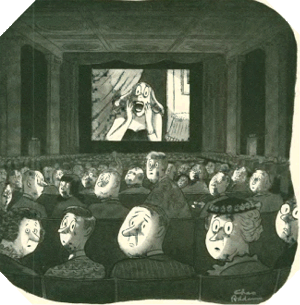The phrase “survival of the fittest” erroneously attributed to Charles Darwin (1809-82) [photographed below by his son in 1874 at 65] was coined by the English 19th century philosopher Herbert Spencer (1820-1903) [aptly caricatured left] to denote a biological “life force” at work in society having direction and an end-point. Spencer contended that the most intelligent, ambitious, and productive amongst us inevitably win out, and thereby, through some magical improbable serendipity, benefit all society in some vague way. This so-called “social Darwinism” adulterates Darwin’s genius and makes a mockery of the vital mechanism he so carefully thought through and presented in The Origin of the Species. This social Darwinism speaks to the philosophical roots of the worst republican political dogma. The thinking is erroniously flawed. Favoring the rich and powerful does not benefit society at large.
| Darwin at 65 |
The essential fallacy in Spencer's thinking is that Darwin's insight had nothing to do with a biological "life force" but rather focused on the major problem of biological complexity, namely how did this complexity arise? Francis Crick (1916-2004) [pictured below, right in 1953], 1962 Nobel Prize co-winner for his work in the molecular structure of DNA explains it succinctly as follows:
"Natural selection, Darwin argued, provides an “automatic” mechanism by which a complex organism can survive and increase in both number and complexity. I say “automatic” to mean that we need not involve a special “life force” or “intelligence” to direct this process.
How does natural selection work? The essential trick is to ensure that in favorable circumstances an organism will be able to multiply very greatly. This is usually done by a process of geometrical multiplication, by which one organism gives rise to several others, identical to itself, each of which in turn can produce identical descendents. The unavoidable “copying errors” in this process will make some of these descendents differ (usually rather slightly) from the original ancestor, and some of these must be capable of being copied exactly. As the population increases a time will come when the environment can no longer support such a large population. There will then inevitably be the elimination of some organisms, leaving others as survivors who alone will produce descendants -- will thus automatically be selected. A really beautiful mechanism, the discovery of which is one of the great intellectual triumphs of our civilization" ... "Of Molecules and Men".
 |
| DNA discoverers |
How does natural selection work? The essential trick is to ensure that in favorable circumstances an organism will be able to multiply very greatly. This is usually done by a process of geometrical multiplication, by which one organism gives rise to several others, identical to itself, each of which in turn can produce identical descendents. The unavoidable “copying errors” in this process will make some of these descendents differ (usually rather slightly) from the original ancestor, and some of these must be capable of being copied exactly. As the population increases a time will come when the environment can no longer support such a large population. There will then inevitably be the elimination of some organisms, leaving others as survivors who alone will produce descendants -- will thus automatically be selected. A really beautiful mechanism, the discovery of which is one of the great intellectual triumphs of our civilization" ... "Of Molecules and Men".




